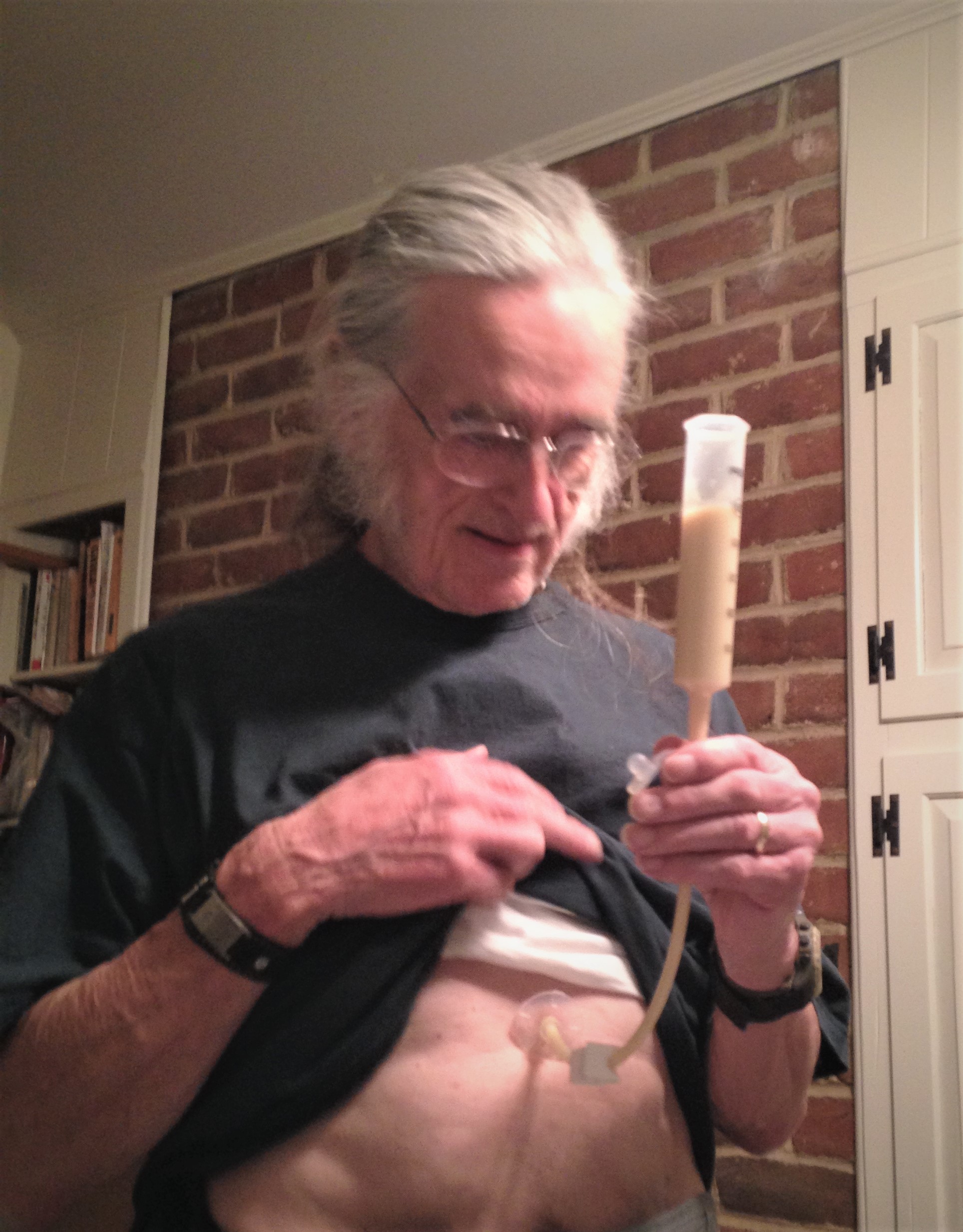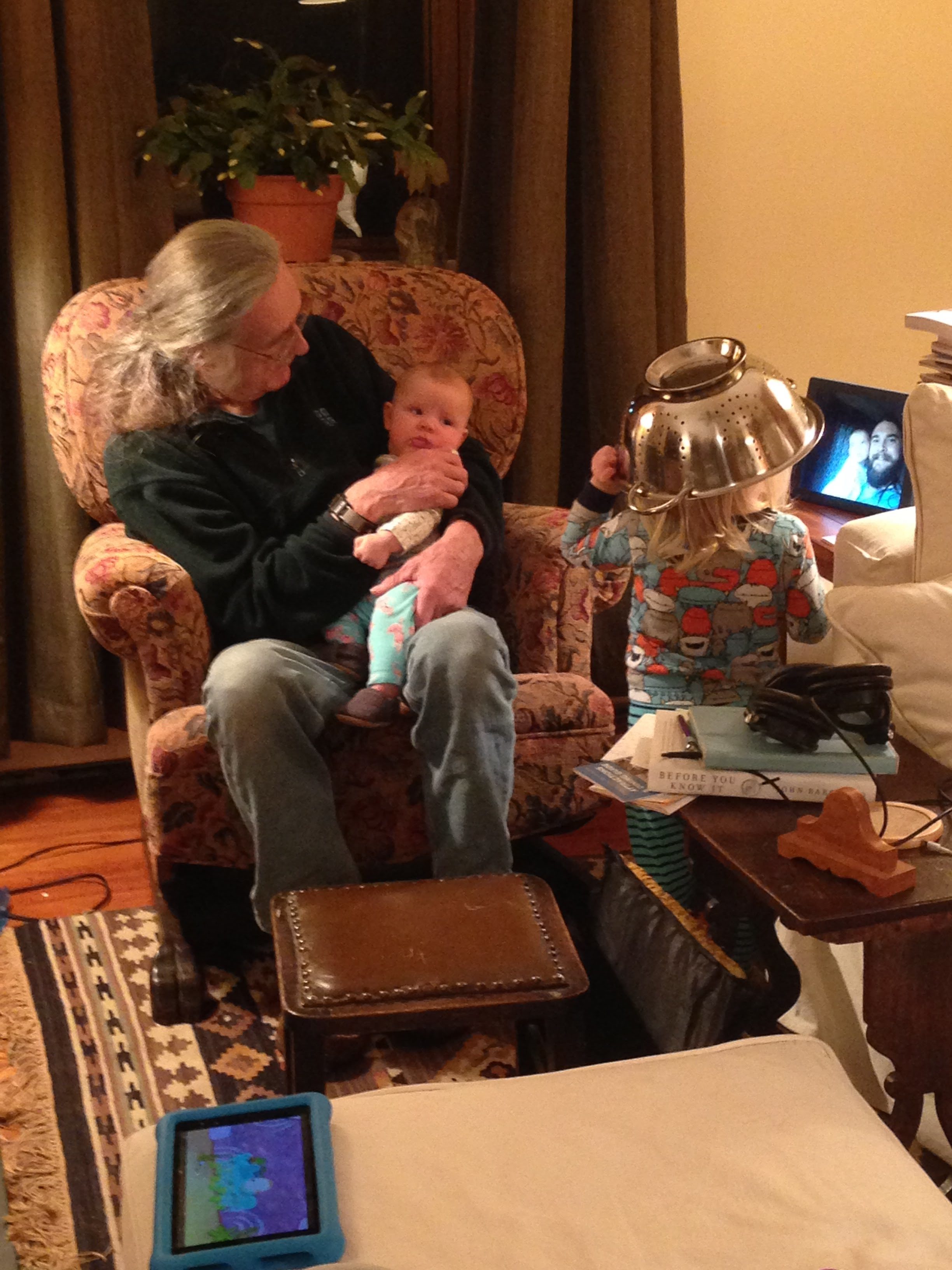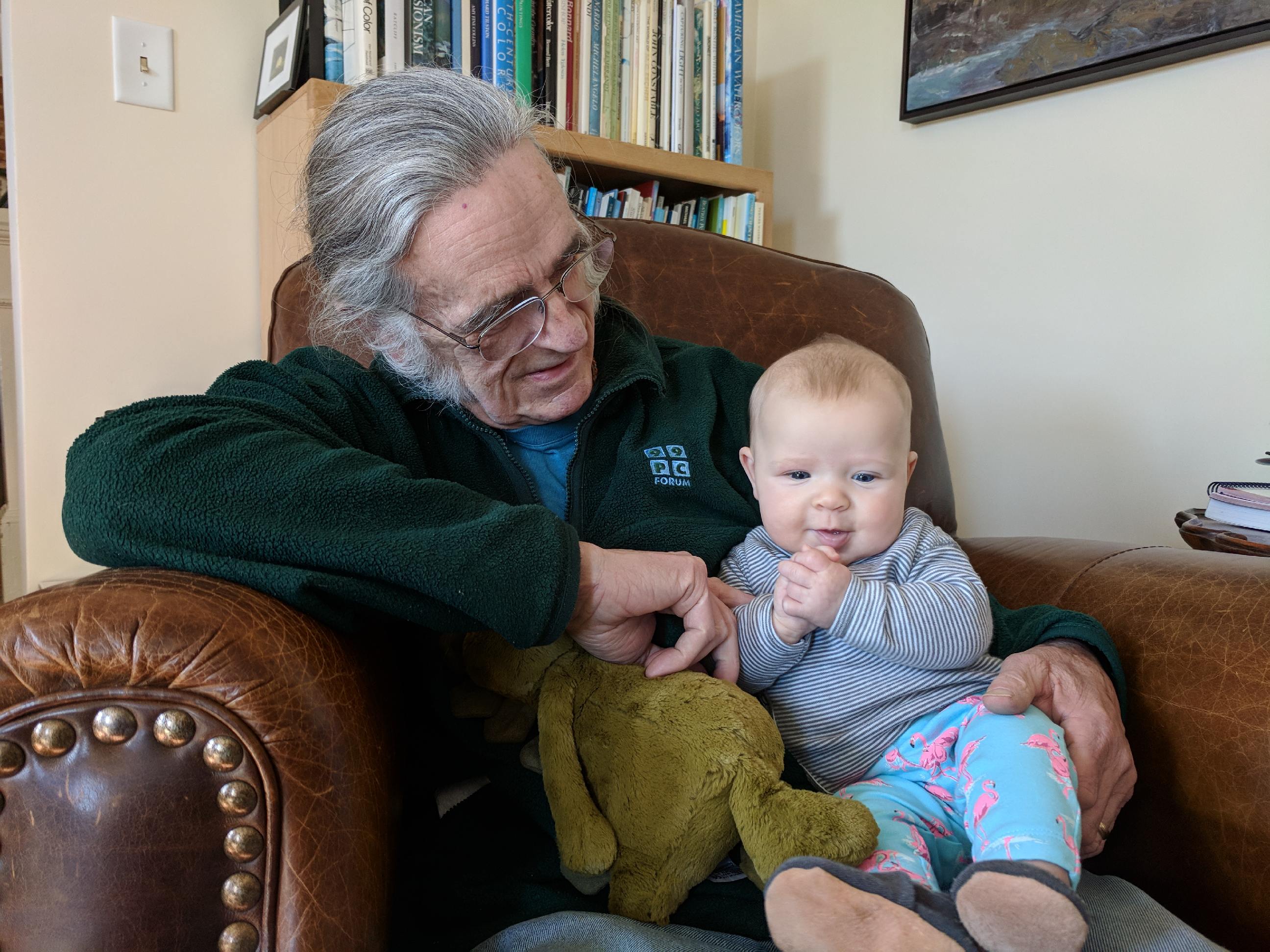Although it took longer than I expected to adjust to a new diet taken by tube and I hadn’t expected my mind to slow down, by the end of the month I was recovering well.
Feb 5 – To my family
I started keeping a daily diary when I had the feeding tube installed so I could keep track of my recovery. I imagined it would take a week but it has taken two, chiefly because the only food I get now is so very different. It has taken my gut a couple of weeks to figure out how to digest it. All I’ve done for the past couple of weeks is read, which was great, but now I want to start doing things again. Fortunately, the cold weather will help me to be sensible about that. I’ve felt cheerful throughout my recovery 🙂
Here’s the diary:
Day 1 (Jan 23) – I don’t remember anything about the surgery, which took very little time, just feeling not a lot different while in the recovery room but less comfortable while we drove home. The nurse had come the day before the surgery to tell us everything we’d need to do and she came again when we got home. She showed us how to proceed by feeding me a container of the high-calorie soy protein formula and a couple of Benadryl tablets to help me sleep.
Day 2 – I slept soundly for 11 hours. The wound was a little painful and I felt as if I had a severe stomach upset, but I was comfortable lounging in my recliner and I was able to ingest three containers of the formula. That’s 1,500 calories. I’ve been prescribed 2,000 calories per day. I’ll need more than that to maintain my current weight.
Day 3 – By the time night came I felt very tired so I took nothing to help me sleep. That was a mistake. It took me a very long time to get to sleep and I kept waking myself up by biting my cheeks. I felt exhausted by morning but slowly felt better as the day progressed. We were able to get all 4 containers of formula into me during the day. At the surgery wound I felt the kind of pain when a wound is repairing.
Day 4 – This night I took 2 Benadryl again and I slept soundly for 11 hours. The surgery site felt better and my stomach felt normal. I felt good all day and ingested 3.5 containers of formula.
Day 5 – I took one Benadryl that night and asked Felicity to wake me to feed at 8 because I felt okay to go to a screening of Tosca at the Met the next day. I had 1.5 containers of formula when I woke but not enough of it was digested to make room for more in my stomach by the time we had to leave for the theater. On the way home after the terrific performance I wanted the taste and texture of food in my mouth for the first time since I stopped eating that way. I had 1.5 containers of formula when we got home at around 4:30 . Not enough had digested by 9 pm so I had only 1,500 calories this day.
Day 6 – I woke after 9 hours and took 1.5 containers at 9 am. I feel the need to be cautious with the feeding tube although It feels as if it’s healing fine. This afternoon it again feels odd to have stopped eating. I ingested 1 container at 2 pm and the remaining 1.5 containers at 8. It all went well. This is the first day when my feeding proceeded without difficulty and on a predictable schedule. This is a substantially greater change for my system than I imagined. It’s not just a different way of feeding that doesn’t involve the mouth, it’s an entirely different form of nutrition. My only food since the surgery has been a soybean-based formula. My body is getting its energy from a completely different source. Different enzymes are required and there are no solids. There is no stimulation from the mouth.
Day 7 – I have some feeling of caution when I move but I don’t feel like an invalid. I still can’t quite concentrate on anything intellectually demanding. I feel as if I’m powered by a gas engine that is now being fueled by kerosene.
Day 8 – My brain is working better. I’m able to give feedback on a chapter of Doma’s thesis. I go for a walk for the first time. It’s cold and the wind is strong so it’s a short one. I ingest 4 containers of formula but it took seven hours to digest the first container and a half.
Day 9 – I give myself food and meds without help for the first time. This is the first day the place where my tube is attached does not feel fragile so I have a shower. I feel normal for the first time.

Day 10 – I expected to be back up to pre-surgery level of energy today. Wrong; I read for a little while after feeding myself breakfast then napped for two hours. I had only one container of food six hours after breakfast because there wasn’t room for more. Instead of adding water to the formula with the evening feeding I had two containers of formula, a total of 2,250 calories for the day. I’ve lost a few pounds and I can’t afford that.
Day 11 – More energy today and a lovely visit by Dan and family. I had 4.5 containers of Nutren and one of Ensure for a total of 2,700 calories. I’m coughing much less now, which must mean some food was getting into my lungs before.
Day 12 – My energy is okay today. I’m starting to miss the pleasure of eating, not just the enjoyment of a meal with others but the eating itself, the tastes, fragrances, textures. I will train myself to enjoy memories of eating, not regret that I can’t have the experience now.
Day 13 – To Johns Hopkins for a checkup with my neurologist and the folks at the ALS clinic. Everyone is friendly and very helpful. The neurologist said: “You definitely have ALS but perhaps you will be one of the few whose symptoms do not spread to other muscles.”
We will go back in April so I can try a bunch of text to speech tools although I suspect writing will always be quicker for me.
The nutritionist will do what needs to be done so I can get 6 containers of formula per day, i.e., 3,000 calories. She says I can switch to that now using the supply I already have because it won’t be a problem. I seem able to digest the formula okay now, so I’ll move to 2,500 calories tomorrow and restart work, cautiously, on the cross-trainer.
The only change they detected today was reduced lung capacity which I believe is because I stopped cardio-vascular exercise quite a while ago and I have gotten very little exercise at all for the last few months. My arm and leg muscles are visibly smaller. It will be very good to regain strength.
I also had a liver function test. I’ll let you know the result.
The nurse who came to show us how to use the PEG tube was wonderfully helpful. She’s very smart, was a dairy farmer for many years, and she studied Tibetan culture among many other things in college. My neurologist who is Indian, very much enjoyed my Namaste greeting, and he is very happy that I’m doing so well and have a good attitude. All the specialists from the ALS clinic were super helpful.
I’m very lucky to be in such great hands.
Feb 5 – from Felicity
Martin I think you summed it up pretty well. The formula food has a casein/soy protein base neither of which you are used to digesting so the necessary gut bacteria will have to have time to adjust their populations.
It is a big shock to the system to have a tube shoved through a hole into your stomach, both physically and emotionally let alone just recovering from any surgery so it’s not surprising that it’s taking a while to regain your energy. Upping the calories will help too. You are adapting very quickly to the new feeding regime and looking stronger every day. It’s such a relief not to hear your scary coughing after a meal now.
Feb 5 – From one of my sons
From an outsider’s perspective, not seeing you everyday, you seem healthier than at Thanksgiving… I could see a change in your mouth perhaps, but you seemed in good spirits 🙂
Feb 9 – To my family
All results from my liver function text are well within the acceptable range. It occurred to me afterwards that the neurologist may have ordered it in part to make sure the precious pills are doing no harm 🙂 I haven’t restarted them yet because they do have a powerful effect but I should be able to pretty soon.
We went to see the surgeon yesterday. He proclaimed the tube’s location “picture perfect.” He also said I don’t need to be so cautious about when I feed myself as the nurse told us. He said my stomach will expand to accommodate more food even if it still contains some that is not fully digested from my last feeding. That’s good news.
Today is my fourth day of feeding myself 3,000 calories per day and I feel better. My weight had dropped to 135 pounds and I was back to 138 last night. I started doing 10 minutes at very low intensity on the cross-trainer on my first 3,000 calorie day. I’m now doing two 12 minute sessions per day and I feel better as a result.
I’ve noticed one physical and one mental change. The first medication I took to reduce salivation wasn’t very effective so I was advised to switch to atropine drops under the tongue. They’re normally used as eye drops. They are, as the ALS clinic lady said they would be, very effective. The downside, though, is my mouth feels parched. I have a tremendous desire for a cold beer, or even cold water 😉 I haven’t figured out a solution yet because now I’ve stopped coughing I don’t want to swallow anything and risk stuff getting in my lungs again. Sucking an ice cube wouldn’t work because my mouth is much more sensitive to heat and cold.
The mental change is, I’m missing eating much more. That results partly from the parched feeling in my mouth. Felicity was munching fried chicken and French fries on the way back from the surgeon yesterday and I so much wanted to put one of those fries in my mouth. But it’s also that eating is such a big part of our lives, especially meal times with our loved ones. It’s just not the same sitting with Felicity unable to talk and also unable to write replies while I’m tipping formula down my tube. It doesn’t take long to feed myself now though, so I’ll get used to that
So all’s going well and I continue to feel blessed to be alive.
Feb 13 – To my Tibetan doctor
I’m going to restart the precious pills tomorrow morning, an auspicious day. It feels as though my body is still adjusting to the formula but I’ve regained 5 lbs and I’m back to 140. The feeding process has become routine and uneventful.
A few days ago I resumed exercise on the cross-trainer at very low intensity. It feels positive but I’ve lost so much strength. There’s no sign of twitching in my arms or legs so I believe it’s just the result of too little food and almost no exercise for too long.
I’m wondering if that lack of exercise also explains the weakening of my diaphragm. I think I mentioned that my lung capacity was lower when it was tested at the ALS clinic? I just did 12 minutes on the cross-trainer and had to pause after 9 minutes because I was going a bit harder than on previous days and I was having trouble getting enough air. I rested for a short time then did the remaining 3 minutes at a slower pace and I feel fine. I just can’t breathe as deeply as before. It would be welcome if that corrects itself as I slowly build up my exercise program.
I paused my practice while I was adjusting to the feeding tube because I couldn’t sit in that position without risk of acid reflux. I can sit without difficulty again now but I’m having a lot of troubling focusing. I don’t feel worried, it’s just that my mind keeps wandering off in discursive thoughts. Focus will return when it does 🙂
No other news. All’s well.
Feb 16 – To my family
This morning I understood at last what one of my teachers meant when he suggested we turn our eyeballs inwards. He was pointing to the context in which our sensory input becomes our experience.
He was referring not so much to our ideas as to our emotional expectations and our stories that go along with them, which are also the raw material for our dreams that are triggered by incidents during the previous day.
I realized that my experience since I got the tube is off in some way, so I’ve been looking inwards trying to spot where my habitual experience no longer corresponds with reality.
Adapting to the new diet and method of feeding takes a little time but it’s really pretty easy. The mechanics of taking meds, formula and water and keeping the tube and incision area clean are all common sense.
I slowly and steadily got my weight back up to 140 lbs on 3,000 calories a day, then dropped to 2,500 calories so I don’t keep gaining a pound a day. I imagine I’ll need to up my calories when I start working outside again because I’m doing almost nothing right now except reading and online stuff.
I postponed restarting the Tibetan precious pills until a couple of days ago to give my body the chance to adjust fully to my new diet. It’s much easier to take the pill via my tube than my mouth (they’re very bitter) and I felt fine afterwards.
Watching my body is not something I’m used to, though. I’ve been healthy almost all my life and it was obvious on the few occasions when I wasn’t. But part of my body has been weakening for almost two years and it has now stopped working altogether. I’m not worrying about the future as far as I can tell, but I am trying to notice changes, and when I detect them I of course try to form a theory about them.
I intended to do two 12 minute sessions on the cross-trainer daily but I’ve only had the energy to do one, and when I pushed too hard a couple of days ago I had to pause after 9 minutes because I was so short of breath. I was soon fine again and I did the remaining three minutes without difficulty but then I remembered the technician at my recent ALS clinic visit saying my lung capacity is reduced. I wondered if my diaphragm will regain strength as a result of the cross-trainer program and how long that may take.
Then as I watched the casein-soy formula going down the tube into my belly this morning I began to wonder about the health of this diet. It seems so artificial. I thought, maybe this is like subsisting entirely on pureed Big Macs, fries, donuts and soda. Of course, it isn’t — it’s better for me than what I was eating before.
I haven’t been looking inwards long enough to identify where my life experience is out of kilter with reality but I feel like I’m onto something. It’s good to notice how changes in my body and its inputs are changing my life experience, but it would be a mistake to spend a lot of time thinking about all that. It could even be that thinking about it is most of what is off about my experience.
My daily health diary is helpful because there’s so much variability in my symptoms. The parched feeling in my mouth went away after 4 days, for example. I thought atropine saliva reduction drops might be the cause so I stopped taking them. I barely dribbled for a few days but then it started up again so I resumed the atropine. I’ve been taking it for a few days but I’m still dribbling. On the other hand, my mouth doesn’t feel parched. This is why thinking about what’s going on while it’s happening tends not to be very productive.
What I am sure about is, my body is regaining strength, I’m eager for Spring so I can start working outside again, and in the meantime I’m enjoying reading. I’ve read about half my books about the Abrahamic religions and the Middle East that I bought years ago hoping to read them soon and I’ve also been reading some very moving recent novels.
I hope this email makes some sort of sense? I’m happy and everything is fine but I’ve begun to realize that my life is more different now than I was acknowledging and that I’m not yet experiencing it with full clarity.
Feb 25 – To My Family
Felicity says I look much better now. I move more purposefully and look happier.
That’s very encouraging because I’d just handed her a note saying: “I was so relieved when I finished 15 minutes on the cross-trainer, then I saw in my daily log that I’d done 20 minutes the last couple of times”.
Felicity said the same thing a week or so ago, too, so it must be true despite my own feeling of frustration that I haven’t regained my strength yet.
I started on the cross-trainer almost three weeks ago, beginning at very low intensity for 10 minutes and doing that daily. I don’t do it on the days when I take a precious pill now I’ve restarted that regimen but I’ve been increasing the time and intensity on the two days between pills.
I feel better after I exercise and it also felt good to get outside and dig up an old grape vine in a flower bed a few days ago. I try to remember it will take me longer to regain strength now I’m 73. I’m persistent but I’m really not all that patient.
Feeding myself via the tube is quick and very easy. There’s no actual pleasure in it, though, because there’s almost no sensation. I do get fragrance up my throat when it digests, however, and that feels like tasting. So I tried putting coffee down the tube and was delighted to get that fragrance, too. Then I tried a beer and while it’s not even close to the experience of drinking one, it does feel good.
It’s been raining for a few days, which the grass likes. It will be soon be time to start mowing and I’m looking forward to that. I’ve been enjoying the opportunity to do a lot of reading but doing nothing other than reading leaves me feeling like an invalid.





